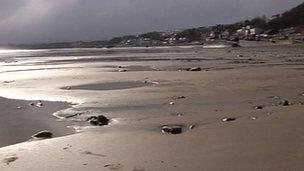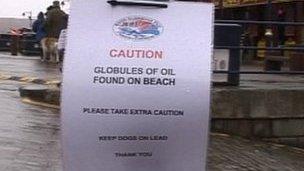Washed-up oil deposits kill seabirds in Yorkshire
- Published

Most of the oil was found in Filey but there was no sign of it by Tuesday afternoon
Up to 15 seabirds have died and dozens more have been found covered in oil after deposits washed up on Yorkshire beaches.
The deposits were brought ashore by strong winds on Sunday afternoon.
Following a clean-up operation between Scarborough and Speeton, the Yorkshire Wildlife Trust said the oil seemed to have broken up and dispersed.
It said about 50 birds in total, mostly black-headed gulls, had been affected.
The trust said it was "hopeful that the situation will not worsen".
A spokesman urged people to report any seabirds covered in oil and not to touch them.
'Beaches still open'
The trust said staff at its Flamborough centre were on high alert as thousands of birds were returning to the Yorkshire coast ahead of the breeding season.
Manager Kirsten Smith said: "Oil or other harmful substances can be lethal to seabirds and the unfortunate timing of a spill like this could deal a devastating blow to Flamborough's celebrated seabirds."

Signs warning of the oil deposits were posted by Scarborough council
Beach users and surfers were advised to stay out of the sea.
Scarborough Borough Council said some of the oil deposits were the size of a plate.
Its head of environmental services, Andy Skelton, said the situation was being assessed and warning signs were put up at beaches.
"The substance has been found at Scarborough South Bay, Cornelian Bay, Cayton Bay, and Filey," he said.
Mr Skelton said an inspection of the beaches on Tuesday morning found no further oil deposits.
He added that beaches were still open to the public but urged people to keep away from oil deposits and report any sightings to the authority.
A spokesperson for the Maritime and Coastguard Agency said: "An MCA counter-pollution surveillance aircraft has carried out a search of the area, but no pollution was detected.
"Tests are now being carried out on a sample of the product to try to identify exactly what it is and if at all possible, to determine the source."